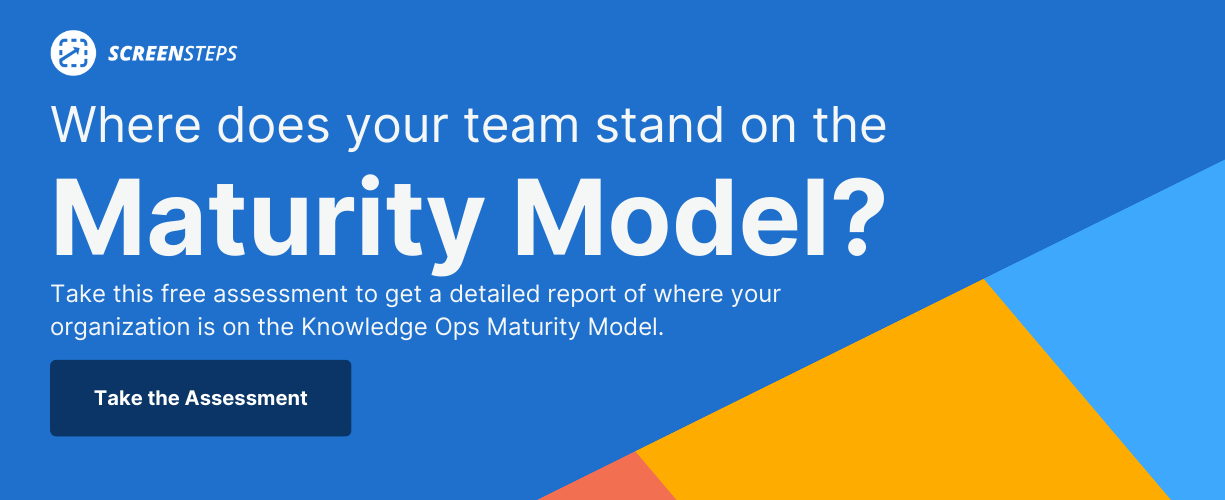14 Signs Your Business is Operating Using Tribal Knowledge
Does your company rely on tribal knowledge?
Tribal knowledge is the most common way that companies transfer knowledge to their employees. It is also the lowest form of knowledge transfer. And it is somewhat of a risky knowledge transfer strategy.
Working for ScreenSteps — a knowledge ops solution that provides a full solution for helping companies train and empower their employees — I’ve learned to recognize the signs when a business is leaning too heavily on tribal knowledge.
Here are 14 signs that your business is operating using tribal knowledge. This list will help you identify whether your company is reliant on tribal knowledge as well as provide you with a vision for how to move away from tribal knowledge.
1. Onboarding is long and difficult
How long does it take to onboard new hires? When you rely on tribal knowledge, training tends to last longer than if you use a more advanced knowledge transfer strategy.
If your training takes longer than a month, most likely, your company relies on tribal knowledge.
This typically means trainers need to plan months-long training to go over everything. The intensive process is exhausting and can be demoralizing because of some of the other signs listed below.
2. Employee turnover rate is high
When onboarding is long and difficult, that increases the chances of new hires quitting before training is even over.
This increases pressure on your HR department as they are constantly needing to invest time and resources into recruiting new hires. Hiring is an ever-revolving door.
It’s exhausting and frustrating for your recruiting team and trainers as well as for your supervisors and employees who need to cover those empty positions.
3. Employees rely on memorization
Companies that require employees to memorize all their processes and procedures are not only playing a risky game, but they are also putting unnecessary stress on their employees.
When we’ve talked to businesses that had complex procedures, they’ve said some new hires have become physically ill when it comes time for them to try a procedure on their own.
That is not a work environment you would want to work in every day.
4. Employees frequently make mistakes
Your supervisors are noticing that employees are making a lot of mistakes.
Supervisors are frustrated because they know they trained employees on the right way to handle procedures. Employees are downtrodden because they are trying but can’t seem to remember every detail of all of your procedures.
🔎 Related: How Much Does Tribal Knowledge Cost Your Company?
5. Employees are dependent on supervisors
How long does it take for new hires to reach proficiency? By that, I mean, how long does it take before your employees can handle the majority of tasks 100% on their own?
For many companies, it takes anywhere from 6–18 months for employees to work independently.
That leads to low employee morale because they feel like they can’t ever get anything right. Plus, it puts a burden on supervisors.
6. Supervisors don’t have time to get their assignments done
Supervisors and your support team are overwhelmed by questions.
Instead of spending their time working on projects and optimizing procedures, they spend most of their time answering employee questions. Often this involves answering the same questions over and over again.
This is a fast track to supervisor burnout. Supervisors are exhausted and frustrated because they can’t ever get anything done on their to-do list.
7. You have little to no documentation
Do you have documented policies and procedures in your company?
Companies that don’t document their policies and procedures in easy-to-access and easy-to-follow guides are forced to rely on tribal knowledge. Employees are forced to memorize every detail or ask their co-workers and supervisors for help.
Without digital guides, you can’t hold anyone accountable.
Need help documenting policies and procedures?
Download this free digital guide template packet. The five templates will get you started on writing checklists, reference articles, decision trees, and more. Get more tips on writing SOPs here.
8. Documentation is outdated
Having something documented might seem like you aren’t relying on tribal knowledge. But, if you can’t find or follow the digital guide, then you still end up relying on tribal knowledge.
If you’re looking at the Knowledge Ops Maturity Model — a model that shows the progression of knowledge ops in business — having something documentation is technically in the Document Stage. However, because digital guides aren’t reliable, your employees end up defaulting to tribal knowledge (aka Stage 1).
To avoid relying on tribal knowledge, you need to keep all of your digital guides accurate and up-to-date.
9. You can’t scale your team
Because employees heavily rely on supervisors and others, it makes it difficult to scale your team.
To grow, you have to add more supervisors. You have to keep the ratio of employees to supervisors low.
10. Everyone is stressed and anxious
This sign may seem general, but it is really a result of these other signs. When things are disorderly and it puts more pressure on your employees, they are inevitably going to be more stressed and anxious.
11. Customer service is inconsistent
With tribal knowledge, it is impossible to provide consistent service.
It’s even difficult for employees to receive instruction because one supervisor might say to perform a task one way while another leader says it needs to be done another way.
Inconsistency leads to confusion and frustration for everyone.
Even customers are frustrated because they get a different answer depending on which employee they talk to.
12. It takes a long time to adapt to change
When your company experiences small changes, how long does it take for employees to adapt to the change? How about for big changes?
Change is inevitable in a company. There are small changes you may experience weekly or monthly, like adding a step to a procedure, changing a deadline date, etc. Then there are big changes like mergers and acquisitions and new software implementations.
This can be discouraging for employees and supervisors as their performance metrics drop as they relearn how to do an old task.
13. Hiring costs are increasing
This comes back to point #2 where your attrition rate is high. When you keep having new hires quit during onboarding or the lifespan of an employee is only a few months or years, you have to invest a lot more time and money into recruiting.
And why are they quitting? Your reliance on tribal knowledge is making your company a difficult environment to work in.
If you have a new hire class of 10 people and only 4 (or even 7) of those employees stick around, you need to move away from tribal knowledge.
14. Operations costs are high
Are your business operations costs high? When you rely on tribal knowledge, your business operations slow down. It often takes more than one person to handle a task that should only take one person.
This drives up operations costs, hurting the bottom line, and frustrating your leadership team as you fall behind company revenue goals.
See how much tribal knowledge is costing your company with this free tribal knowledge calculator.
Escape tribal knowledge with a more efficient knowledge transfer strategy
When your business operates using tribal knowledge, it makes business more difficult.
Luckily, tribal knowledge is the lowest level for a knowledge transfer strategy. You have many options for improving your knowledge transfer plan, which will help improve your employee training and business operations.
Want to escape tribal knowledge?
Take the Knowledge Ops Maturity Grader. This 3-5 minute self-evaluation will help you determine where you are at on the Knowledge Ops Maturity Model. Then you can see how you can improve operations and advance on the Knowledge Ops Maturity Model.




